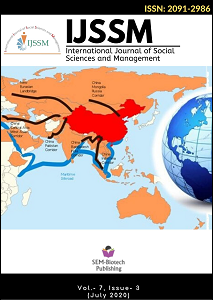Understanding the Needs of Adult Internally Displaced Persons in Three North-Eastern States of Nigeria: The Impact of Humanitarian Response Program
DOI:
https://doi.org/10.3126/ijssm.v7i3.29205Keywords:
IDPs, challenges, Interventions, Boko Haram, InsurgencyAbstract
Introduction: The North-Eastern part of Nigeria is currently struggling with a complex humanitarian emergency. This study aimed to identify the challenges facing the Internally Displaced Persons (IDPs) and evaluate the effect of the humanitarian response projects in alleviating these challenges.
Methodology: The study was carried out in sixteen local governments of Borno, Adamawa and Yobe states using mixed methods. The quantitative data were obtained by the administration of a structured questionnaire to men of 25 years and above and women aged 15-49 years. The data obtained were analysed and complemented with the qualitative data from Focus Group Discussions (FGDs). Data were analysed using SPSS version 20.
Results: The majority of the IDPs were between age 25 – 29 (26.0%), women (56.7%), 40.8% had Qur’anic education, and 76.6% were married. The major challenges facing the IPDs were hunger (26.2%), lack of clothing (19.9%), regular sickness (18.5%) and lack of drugs (9.8%). Rape cases constituted (4.3%) of the total responses. The major sicknesses were Malaria (53.1%) and skin infections (34.4%). The items received from the NGOs include foodstuff (27.9%), soap and detergents (19.0%), clothing (14.0%), and drugs (9.4%). The majority (46.5%) rated their situation since they arrived in the camp very good, 52.1% affirmed great improvement in their situations, and 9 (1.4%) stated that their situations were deteriorating. The majority (33.3%) were trained on tailoring, 21.4% on cream-making, 17.0% knitting and bead making (15.2%).
Conclusion: Humanitarian services positively impacted the IDPs, yet there is need for government and the humanitarian services providers put more efforts the alleviate the suffering of the IDPs in Nigeria.
Int. J. Soc. Sc. Manage. Vol. 7, Issue-3: 152-158
Downloads
Downloads
Published
How to Cite
Issue
Section
License
This license enables reusers to distribute, remix, adapt, and build upon the material in any medium or format for noncommercial purposes only, and only so long as attribution is given to the creator.




